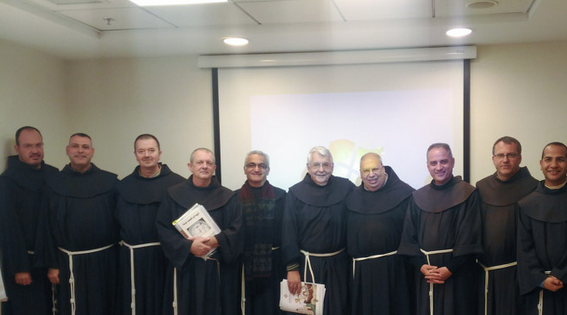The course was focused on pastoral planning, and it brought together the parish priests of the Custody of the Holy Land from January 8-11. As part of the formational course, which the Custody has always hosted, an exceptional guest came from Italy. Fr. Matteo Giuliani, a Franciscan friar is an expert in catechetics, pedagogy and the teaching of religion in Italian schools. “I was called for this formation course and this is the first time I come to the Holy Land since a pilgrimage I took more than 30 years ago,” explained Fr. Matteo, a native of Trento in northern Italy. In the four days full of events, the situation of the parishes was discussed, as were the projects of Christian initiation, the methodologies of work in the catechetical and formative fields, and pastoral choices for marriage.
“The first move I made was to realize what the most urgent problems in the lives of these pastors are,” he said. “A diverse world emerged from the conversation regarding the recipients of their action, because there are different languages and cultures in the places of pastoral care.” The work of Fr. Matteo was then to gather the areas in which they wished to be helped in terms of pastoral planning. “It means sitting down with other collaborators, which should not be taken for granted, but must happen frequently,” the friar suggested. “In fact, facing the situations is the best solution, and according to the priest, “from an external perspective, clarity is brought to issues.” The goal of the pastors must be to get to know the recipients of the projects better (children from three to six years old, youngsters who are making their Christian initiation and others) and to be aware of the objectives in order to achieve them, considering the steps that can be reached.
“I think it’s great that these pastors are part of a group that needs to exchange opinions and ideas and to support each other,” said Fr. Matteo. “I think that they valued this gathering. The working method of dividing into groups and writing things down, then waiting for feedback from the formator paid off: “They appreciated that I take what they say seriously and that I then delve into those topics more deeply, thus valuing what they have to say.”
Over the four days of formation, the pastors of the Custody, who came from all over of the Holy Land, shared many of their stories. There are parish priests who work with young couples of believers and who have come to build their material and to make the most of their contributions, for example. Fr. Matteo Giuliani explained to them how best to work in planning for the parish: “When you do a project, you do not have to clericalize it. You can outline it with your closest collaborators, but then there must be a discussion with the laity. One aspect to work on is certainly increasing the parishes’ volunteering base. “I am amazed at the lack of charitable and formative volunteering that they are struggling to launch,” said Fr. Matteo. “The pastor is always the point of contact for every type of need. Instead, fostering the charitable spirit and helping each other is an important step.”
Two new ideas peaked the pastors’ interest: a reading of the biblical text in which all of the aspects of free narration were rediscovered, as well as the use of art as a means of communication of sacred texts. “Pastors must not forget that attention to the involvement of their audience and respect for their level of knowledge is fundamental,” concluded Fr. Matteo.
Beatrice Guarrera


